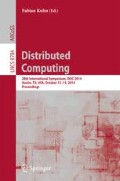Abstract
Linearizability is a powerful consistency condition but can be expensive to implement. Recently, reserarchers have suggested gaining performance by relaxing the sequential specification of objects’ data types. We consider, for the first time, linearizable message-passing implementations of relaxed Queues and prove upper and lower bounds on the elapsed time for Dequeue operations both in the worst case and on average.
Our results imply that worst-case time complexity does not indicate benefit from relaxation. In contrast, we present implementations of relaxed Queues for which the average time complexity of Dequeue is significantly smaller than both the worst-case lower bound for unrelaxed Queues and a newly-proved lower bound on the average time for unrelaxed Queues. We also prove lower bounds on the average time complexity of Dequeue for relaxed Queues that show our algorithms are asymptotically optimal and that there is an inherent complexity gap between different levels of relaxation.
Access this chapter
Tax calculation will be finalised at checkout
Purchases are for personal use only
Preview
Unable to display preview. Download preview PDF.
References
Afek, Y., Korland, G., Yanovsky, E.: Quasi-linearizability: Relaxed consistency for improved concurrency. In: Lu, C., Masuzawa, T., Mosbah, M. (eds.) OPODIS 2010. LNCS, vol. 6490, pp. 395–410. Springer, Heidelberg (2010)
Aspnes, J., Herlihy, M., Shavit, N.: Counting networks. J. ACM 41(5), 1020–1048 (1994)
Attiya, H., Guerraoui, R., Hendler, D., Kuznetsov, P., Michael, M.M., Vechev, M.T.: Laws of order: Expensive synchronization in concurrent algorithms cannot be eliminated. In: Ball, T., Sagiv, M. (eds.) Principles of Programming Languages (POPL), pp. 487–498. ACM (2011)
Attiya, H., Welch, J.L.: Sequential consistency versus linearizability. ACM Transactions on Computer Systems 12(2), 91–122 (1994)
Calder, B., Wang, J., Ogus, A., et al.: Windows Azure Storage: a highly available cloud storage service with strong consistency. In: Proceedings of the 23rd ACM Symposium on Operating Systems Principles, pp. 143–157 (2011)
Henzinger, T.A., Kirsch, C.M., Payer, H., Sezgin, A., Sokolova, A.: Quantitative relaxation of concurrent data structures. In: Giacobazzi, R., Cousot, R. (eds.) Principles of Programming Languages (POPL), pp. 317–328. ACM (2013)
Herlihy, M., Wing, J.M.: Linearizability: A correctness condition for concurrent objects. ACM Transactions on Programming Languages and Systems 12(3), 463–492 (1990)
Lamport, L.: How to make a multiprocessor computer that correctly executes multiprocess programs. IEEE Trans. Computers 28(9), 690–691 (1979)
Lamport, L.: On interprocess communication. Distributed Computing 1(2), 77–101 (1986)
Lipton, R.J., Sandberg, J.D.: PRAM: A scalable shared memory. Technical Report CS-TR-180-88, Princeton University, Department of Computer Science (1988)
Vogels, W.: Eventually consistent. Communications of the ACM 52(1), 40–44 (2009)
Wang, J., Talmage, E., Lee, H., Welch, J.L.: Improved time bounds for linearizable implementations of abstract data types. In: International Parallel and Distributed Processing Symposium (IPDPS), pp. 691–701 (2014)
Author information
Authors and Affiliations
Editor information
Editors and Affiliations
Rights and permissions
Copyright information
© 2014 Springer-Verlag Berlin Heidelberg
About this paper
Cite this paper
Talmage, E., Welch, J.L. (2014). Improving Average Performance by Relaxing Distributed Data Structures. In: Kuhn, F. (eds) Distributed Computing. DISC 2014. Lecture Notes in Computer Science, vol 8784. Springer, Berlin, Heidelberg. https://doi.org/10.1007/978-3-662-45174-8_29
Download citation
DOI: https://doi.org/10.1007/978-3-662-45174-8_29
Publisher Name: Springer, Berlin, Heidelberg
Print ISBN: 978-3-662-45173-1
Online ISBN: 978-3-662-45174-8
eBook Packages: Computer ScienceComputer Science (R0)

